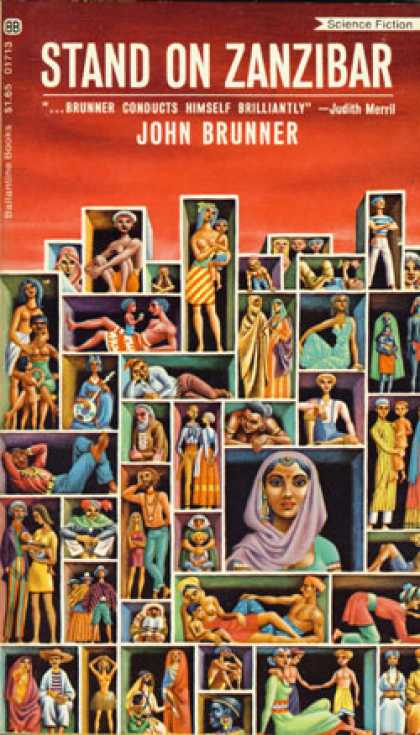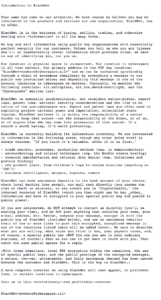I have a friend who works at TOR, the world’s largest SF publisher, and I’ve done a few informal meetings with editors and my friend around what the hell I should be working on at novel length now that I have had my writer card punched by the SF magazine market. (See my bibliography.)

Looking at my 30 or so published stories, I realized that I write mostly in a sub-genre that I think of as being pioneered by John Brunner in the 70s and made huge by writer’s like William Gibson, Bruce Sterling, Neal Stephenson and Michael Swanwick in the 80s and 90s, when we started calling this stuff cyberpunk.
(Googling “near future SF” and looking at that tag at Goodreads reveals a strange collection of titles, some not near future at all, but perhaps accessible to an audience that doesn’t think they like science fiction? The retro SF fantasy of YA novelist Marissa Meyer for example, who I enjoy…)
Brunner wrote four novels all set 50 years from when he was writing them, which subconsciously influenced my 2067 setting for a recent failed SF romance trilogy… (note to self: cyberpunk is over; near futures are not in vogue)
Limiting extrapolation to transformations not involving robust nano-tech and biohacking makes this ‘SF’ sort of retro-futurist or unnecessarily dense technothriller. Science fiction has moved on from cyberpunk, fracturing into biopunk, nanopunk, and steampunk sub-genres; science fantasy and urban fantasy, with plenty of old-school SF still being published inspired by half century old space opera franchises (the modern heirs of Asimov’s foundation and Star Trek and Star Wars, which handwave weakly at post humanism in order to tell stories where people still call most of the shots)
Why do I write in this increasingly unpopular genre?
Well, for one thing it avoids the mind-sucking unknowability of the Singularity and post-humanism. Another reason is that I’ve always been fascinated by gadgets and gizmos and tech and new culture coming down the pike that will unfold in our lifetimes. So my techno-fetishism acts as free research for generating this content.
In the 90s I hung out online, and a few times in person, with two groups, the Extropians and the Cypherpunks, ultra-right, libertarian software developers mostly, Ayn Randians. They had created this organized body of thought about tech and a future built around cryptography and the beloved ever-shrinking-government-small-enough-to-drown-in-a-bathtub. This Extropian thought experiment was conducted mostly in an email list from 1991 to 2006, when the list was closed.
In 2006, the board of directors of the Extropy Institute made a decision to close the organisation, stating that its mission was “essentially completed.”[7]
Extropian culture? You’re soaking in it!
One tech the extropians foresaw would eventually become known as blockchain or bitcoin. The consequences of anonymous interaction facilitated by the net are working themselves out now; from the flurry of fake news that helped elect Donald Trump, to the consequences widespread hacking of weak infrastructure, as in the leaked emails that helped elect Donald Trump, the cypherpunks and extropians explored the often horrific consequences of their coming stateless utopia with a kind of savage glee. They didn’t foresee social media exactly, but they saw a shit load of chaos coming down the internet pike.
As a lifelong progressive, I found the extrapolation challenging; oftentimes nauseating, truth be told. In many ways, as with Gibson, I was seeing the distorted echoes of the regressive era we’re now struggling through; a world of savage income quality and breakneck privatization. (Vast winner take-all-players dominating this world wasn’t part of the libertarian canon, of course, but Extropian’s generally shrugged at this, preferring corporate oligopoly to Big Statism.)
At this time, I began a cycle of stories I called BlackNet, based on the ideas of the list as filtered through my own progressive ambivalence. The term blacknet was part of extropian culture, and googling it reveals this little bit of science fiction world building…
BlackNet is nominally nondideological, but considers nation-states, export laws, patent laws, national security considerations and the like to be relics of the pre-cyberspace era. Export and patent laws are often used to explicity project national power and imperialist, colonialist state fascism. BlackNet believes it is solely the responsibility of a secret
holder to keep that secret–not the responsibilty of the State, or of us,
or of anyone else who may come into possession of that secret. If a
secret’s worth having, it’s worth protecting.

“Blacknet” based services in my cycle of stories were basically people accessing illegal content of various sorts; drugs, weapons, software, tools for 3d printing or fabricating drugs, weapons, etc. I wrote these stories in the 90s, leaving some of them unfinished, and reworked and published several of them in the last five years… the ideas are still mostly current; this stuff is still very much in play.
My Blacknet is now known as a Darknet market. As with any extrapolation, some of the Extropian thought has emerged as real tech (bitcoin, darknet) and some hasn’t caught on. (highly competitive low cost murder-for-hire services, for example.)
I’m still writing Blacknet stories, which are now really technothriller and not SF so much, and generally using the word to gesture at possible but not yet real uses of strong cryptography based products deployed via the net. I’m calling a site which distributes smart contract services to people www.deadmanswitch.com in a work-in-progress…
I need to complete the BlackNet story cycle. It segues into the Zeitgeist Stories, which are my post singularity stories.
Okay, this is a huge topic… sticking a pin it for now. Stay tuned.
